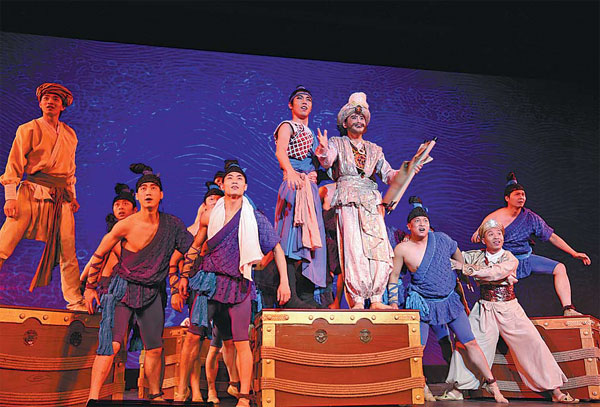Dance drama navigates ancient Silk Road
"I thought the story was excellent. In a modern world, it reminds us of the traditions and the ancestral spirit eight centuries ago," says Bengouffa Mustapha, president of the French association Rencontres after he watched the traditional Chinese dance drama Dream of the Maritime Silk Road.
Bengouffa says he now knows more about the ancient Silk Road's sea route after enjoying the drama performed at the UNESCO headquarters on April 21. He thought that it was important to show what China looked like during the period of booming trade centuries ago.
The Silk Road's sea route of economic and cultural exchanges reached its peak during the Song and Yuan Dynasties (960-1378).
|
A scene of the traditional Chinese dance drama, Dream of the Maritime Silk Road, at the UNESCO headquarters on April 21. Provided to China Daily |
The Permanent Mission of China to UNESCO and the Fujian provincial government jointly organized the performance that highlights the ancient route. Hao Ping, president of the 37th session of UNESCO's General Conference; Irina Bokova, UNESCO director-general; Li Hong, vice-governor of Fujian; and Zhai Jun, Chinese ambassador to France, all attended the performance. More than 1,000, including UNESCO officials, permanent representatives to UNESCO and people overseas Chinese watched the show.
Fujian province was one of the starting points for the ancient Silk Road sea route.
Li says the Dream of The Maritime Silk Road tells the story of two generations of sailors in ancient China chasing their dream of sailing overseas and exploring.
"We hope this show can reproduce the scene of ancient China's international trading culture," Li says.
The drama's plot revolves around a commercial fleet in Quanzhou port, Fujian province. The captain of the fleet is invited by a Persian prince to develop a new sailing route. During the voyage, the fleet is struck by a storm and the captain sacrifices his life to save the prince.
"The Silk Road was an essential thoroughfare for trade and the exchange of goods, but it was much more than that," says Bokova. "It was also a major force for the exchange of ideas, innovation, promoting dialogue between cultures. This was a major social network, well before the Internet, that connected people, connected the world."
She says the ancient Silk Road reminds us that dialogue is not just a byproduct of international relations, but a key driver of human civilization, a continuous force for creativity, for the development of new ideas and for the sharing of knowledge.
"Civilization is inclusive, people can exchange because of this mutual understanding," says Ambassador Zhai.
He says the modern One Belt, One Road initiatives proposed by President Xi Jinping call for different civilizations to respect each other.
Xie Nan, executive director of the drama, told Xinhua News Agency in February that he hopes it can help to deliver China's compassion to the world through the UN's platform.
Since its first appearance at China's National Centre for the Performing Arts in Beijing in August, The Dream of the Maritime Silk Road has been performed more than thirty times during the last half year.
The show's organizers have received invitations to perform in a number of Chinese cities such as Xi'an, Macao, Xiamen and Quanzhou. In February, the dance drama played at UN headquarters.
On April 25, the drama will be performed in Brussels at the headquarters for the European Union.
Han Yingya also contributed to this story.
tuoyannan@chinadaily.com.cn



















